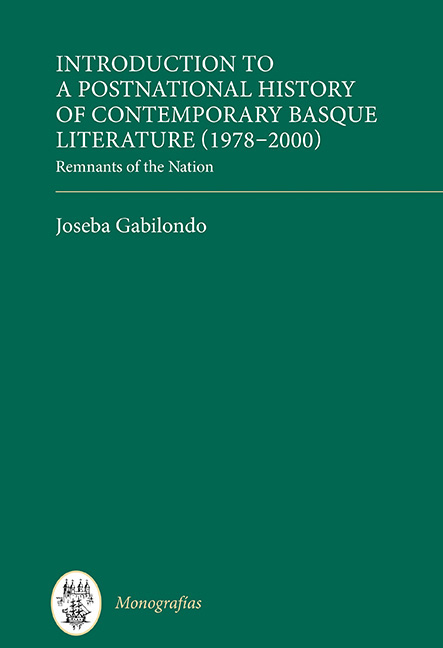 Introduction to a Postnational History of Contemporary Basque Literature (1978–2000)
Introduction to a Postnational History of Contemporary Basque Literature (1978–2000) Book contents
- Frontmatter
- Contents
- Preface and Notes on the Translation
- Acknowledgements
- I Postnational Theory and History
- II Writing the Nation: On Atxaga's Ethiopia and Obabakoak (1978-92)
- 4 Postcolonial and Postnational Literatures: Obabakoak (1988-92)
- 5 On Canon Formation: Ethiopia (1978)
- 6 The Legacy of Modernism: from Ethiopia to Obabakoak
- III After the Nation: Hybrid Postnational Literatures (1992-2000)
- Epilogue: Basque Literatures 2001-17
- Works Cited
- Index
4 - Postcolonial and Postnational Literatures: Obabakoak (1988-92)
from II - Writing the Nation: On Atxaga's Ethiopia and Obabakoak (1978-92)
Published online by Cambridge University Press: 06 September 2019
- Frontmatter
- Contents
- Preface and Notes on the Translation
- Acknowledgements
- I Postnational Theory and History
- II Writing the Nation: On Atxaga's Ethiopia and Obabakoak (1978-92)
- 4 Postcolonial and Postnational Literatures: Obabakoak (1988-92)
- 5 On Canon Formation: Ethiopia (1978)
- 6 The Legacy of Modernism: from Ethiopia to Obabakoak
- III After the Nation: Hybrid Postnational Literatures (1992-2000)
- Epilogue: Basque Literatures 2001-17
- Works Cited
- Index
Summary
With Bernardo Atxaga (1951–) and his novel Obabakoak (1988) Basque literature underwent a radical change. From being completely unknown, even in Spain, Basque literature began to receive global recognition, perhaps best epitomized by the full–page review dedicated by The New York Times Book Review to Obabakoak after the publication of the English translation in 1992. Atxaga's work stands alone though and so does Basque literature – no other Basque writer has received such recognition, not even successful younger writers such as Kirmen Uribe. Consequently, it is of the utmost importance to define the precise location of Basque literature, even though the task may seem daunting at first. I grew up as a reader of the publication by ‘installments’ of Obabakoak, which spanned over a decade (1978–88). As a young Basque interested in literature, this work not only influenced me but also gave me a location as both literary subject and critic. Hence, while I am articulating the place of both Atxaga's work and Basque literature, I am also searching for my own place as a Basque cultural subject.
Most literary and cultural accounts of Atxaga's work tend to fall into two traps. Some would rather ignore contemporary literary theory and deal with his writing as if the nationalist framework of either Basque or Spanish literature could magically encapsulate and protect it from its global dimension. Another critical approach might compensate in the opposite direction by conjuring up a global sociology of its reception, without questioning globalization. This approach would attempt to explain Atxaga's literature as yet another sociological object in full compliance with the new World Republic of Letters.
I truly think that these two critical practices, extreme in their geopolitical fundamentalism, lead to the reinforcement of a global state of affairs. Yet, his work has altered the location of Basque literature in both the Spanish and global arenas in very conflictive ways. Any coherent criticism should at least attempt to do as much, even at the risk of failing. Here, I explore the specific articulations elicited by Atxaga's work in order to explain and reformulate the state of both global literature and theory from the vantage point of my object – Atxaga's work.
- Type
- Chapter
- Information
- Introduction to a Postnational History of Contemporary Basque Literature (1978–2000)Remnants of the Nation, pp. 61 - 84Publisher: Boydell & BrewerPrint publication year: 2019


